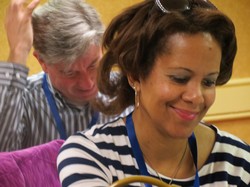To practice the spiritual disciplines of solitude and silence, PC(USA) pastor B. J. Woodworth goes away to a monastery once a year. On his most recent visit, he found himself incredibly restless.
“We chanted Psalms 4, 91 and 134 together at night,” Woodworth said. “After three days, they begin to seep into your life.”
Yet Woodworth found he was having judgmental thoughts. As he watched one of the monks fall asleep, he began to compare himself to others, feeling superior.
Suddenly he heard the words of the psalm that he was reciting: “How long will you love vain words, and seek after lies?”
“I began to sob uncontrollably,” Woodworth said, “as I recognized my need to tear others down as a way of stabilizing my own insecurity.”
“It was as if the Lord was saying, ‘I have something I want you to pay attention to.’”
Woodworth told this story Tuesday at the Disciple-Making Conference as part of a reflection on Matthew 14.
The Gospel narrative begins with Jesus finding out about the death of his cousin, John the Baptist. As he withdraws, crowds follow him. The chapter is neatly divided into Jesus feeding the 5,000, walking on water, and healing the sick.
“Notice what Jesus did,” Woodworth said. “In the midst of his grief and the demands of ministry, he dismissed the crowds so he could go by himself to a mountain and pray.”
Woodworth challenged conference participants with various questions to help them get in touch with their deepest desires.
“What are ‘the crowds’ in our lives? What prevents us from practicing the way of Jesus by ‘dismissing the crowds’? What keeps us from doing this?
“Why do we work so relentlessly? Are we still trying to please somebody? Trying to know that God is pleased with us?”
Through the practice of solitude and silence, Woodworth learned that there was nothing he could to make God love him more. Amid the silence he became more and more convinced that his identity is in Jesus Christ.
Which is why he’s been able to tell the church session at the Open Door that he will not answer calls or email from two o’clock Sunday afternoon until Tuesday morning.
“By not being available, I am ‘dismissing the crowds,’” he said. “I do things that bring me joy, like worshiping, praying, spending time with family. It’s my Sabbath.”
This Sabbath rest—getting in touch with his deepest need—came with the help of a spiritual director.
“I was so tired,” Woodworth said.“ She asked me, ‘Why don’t you give yourself permission to rest?’”
“I began to realize that if you can’t take time to do nothing, then you are enslaved to doing,” he said. “People in a hurry never have time for healing.”
“In Deuteronomy 5, God’s command to keep the Sabbath is tied to the Israelites’ remembering they were slaves.”
“Slaves can’t take a day of rest—so if we’re not keeping Sabbath rest, we’re enslaved to something, or somebody.”
Woodworth encouraged conference participants to embrace freedom by following the way of Jesus—who made it a priority to spend time alone with God.
“I believe that when Jesus withdraws he goes back to the words he heard at his baptism: ‘You are God’s beloved; God is well pleased with you,’” said Woodworth.
“Richard Rohr says that without silence nothing has power to awaken us, to give us joy the world cannot give.”
This year’s Disciple-Making Conference, “Living the Way: Foundations of Discipleship,” continues through January 22.

